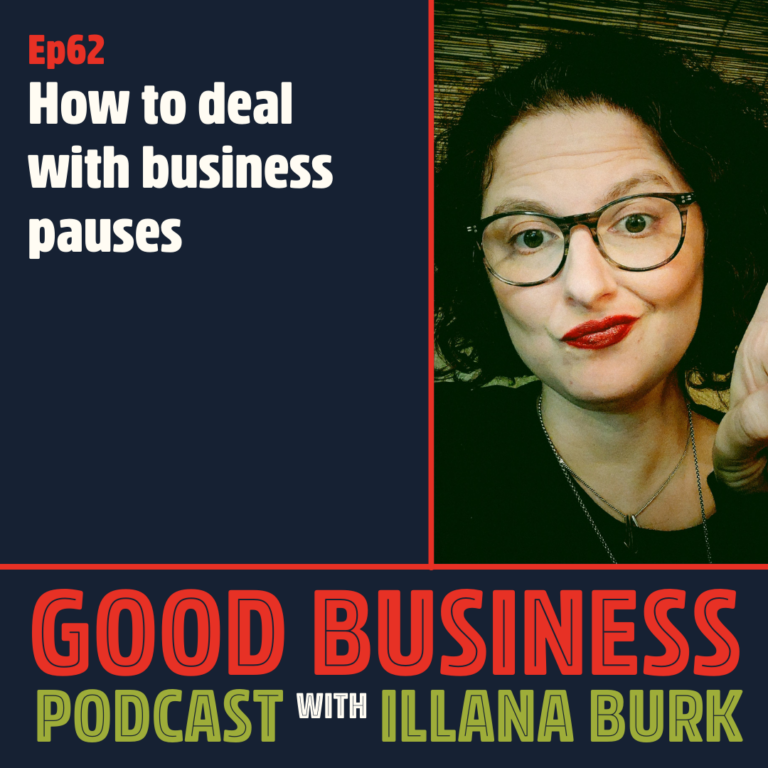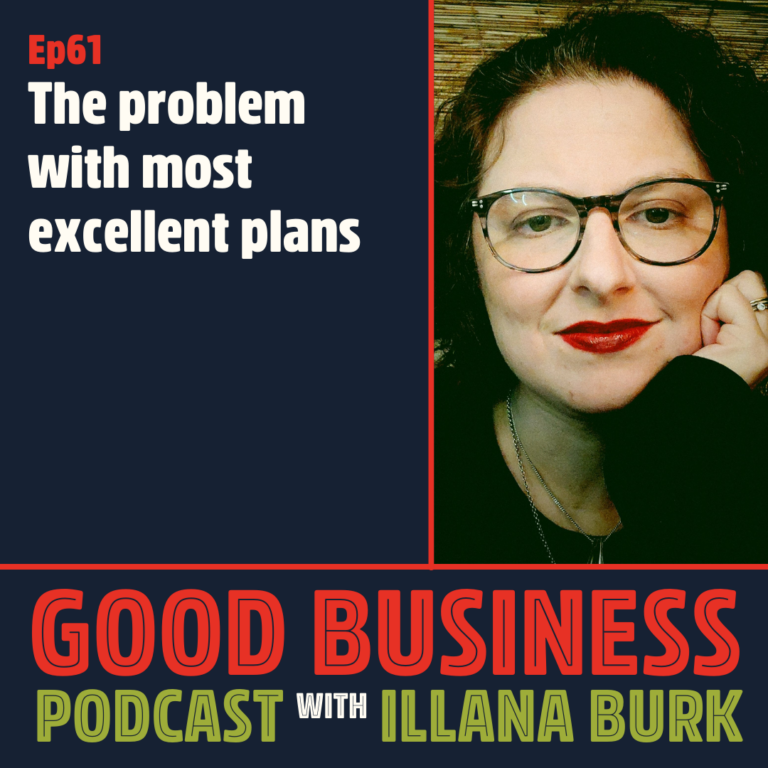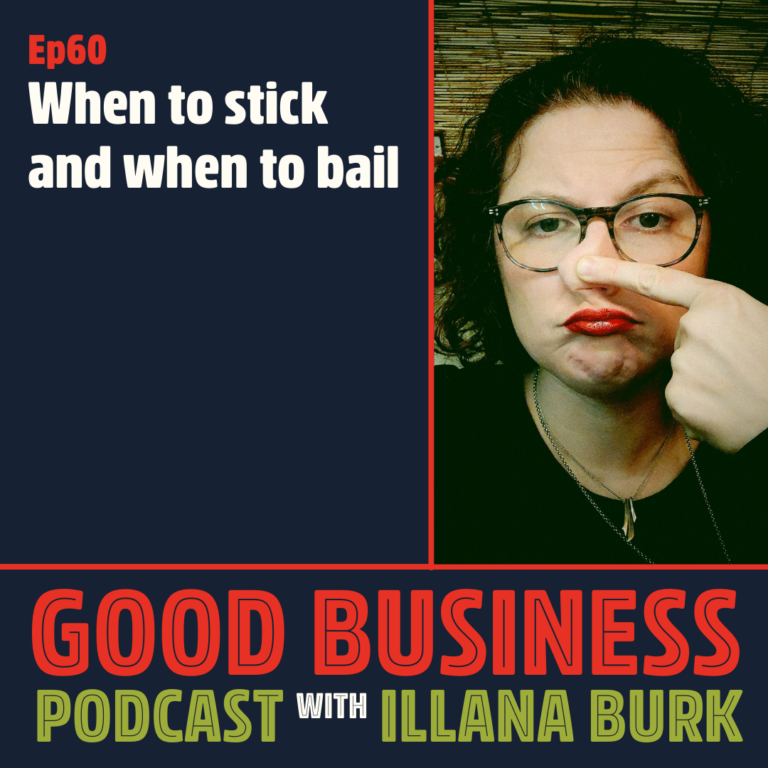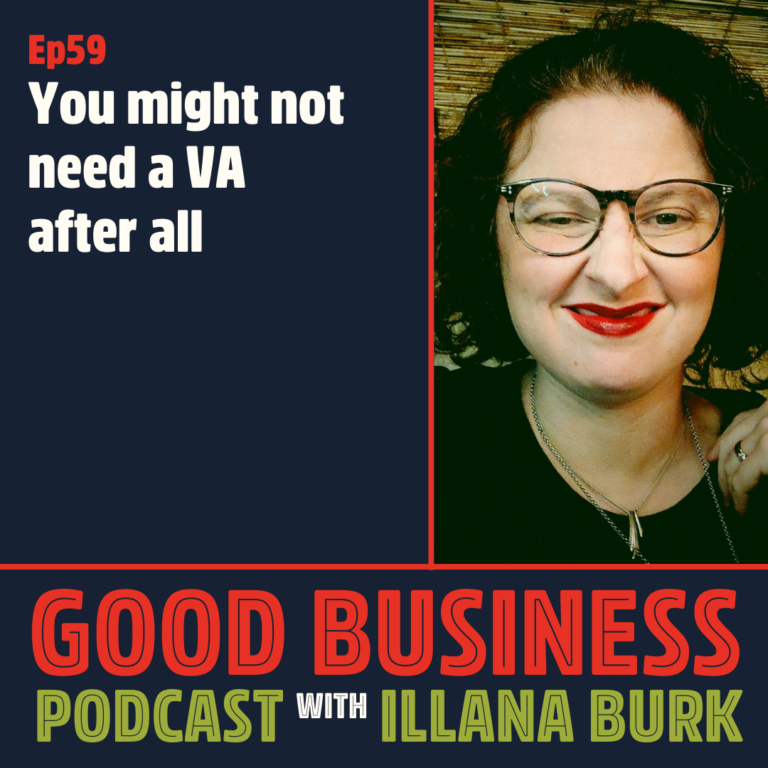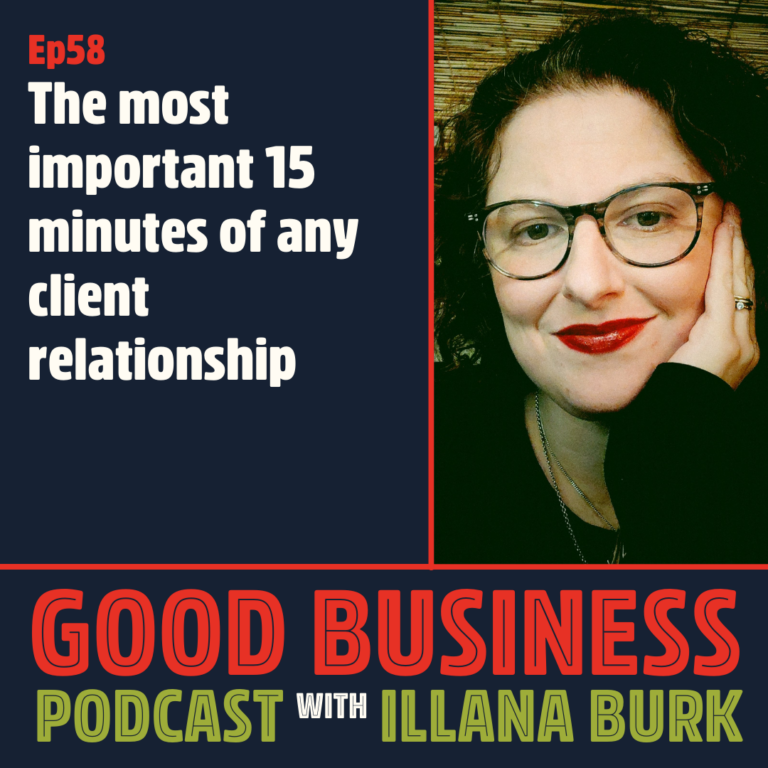In this episode of The Good Business Podcast, I’m talking about good old traditional marketing stuff: SWOT Analysis. But of course, I have my own take on it. Here’s what I’m including:
What is a SWOT analysis?
What you can do about it and/or what does it mean?
How can you assess and understand the resources that are available to you?
That’s what we’re exploring today. Come join me!
Episode Transcript:
Welcome back to the Good Business Podcast. I’m your host, Illana Burk. And today, I wanna talk about, well, we’re gonna start with a conversation about traditional marketing. We’re gonna talk about, our power to affect change through it. One of the things that I pull from traditional marketing is, uh, the concept of doing a SWOT analysis.
Now, this is something that the internet can have lots to say about. Every marketer on Earth knows how to do this. Every MBA, anybody who’s ever taken a business class, it’s one of the first things they teach you. Now, SWOT is S W O T. It stands for strengths, weaknesses, opportunities, and threats. And that’s the beginning part of our conversation.
We’re gonna talk about what you can change and what you can’t,
what things are within your power
and what are not,
and how to deal with that.
So that’s our topic today. So we’re starting by talking about what is a SWOT analysis. Then we’re gonna talk a little bit about what you can do about it, like what it means, uh, and then we’re gonna wrap up with a little bit about, how to understand the resources that are available to you, okay.
And how they fit into that bigger picture of what your strengths, weaknesses, and opportunities and threats actually are. Okay?
So for those of you not fluent, strengths and weaknesses are the things that are within your control. It means that’s stuff that you can actually do something about you, yourself as an individual or you your business is another way to put it.
The second two things are outside of your control. Seems pretty simple, right? You list out the things that are within your control. You list out the things that are not within your control until you actually sit down and do it, because for a lot of you, Your business is you. it’s something you’re passionate about.
It’s hard to think with the perspective of like the big things that could affect your ability to do business and to do your work in the world. It gets real complicated, real fast, and especially if you’re doing it right. So understanding your position and taking stock of your resources with a detached honesty and a sense of object objectivity–
those of you who’ve listened before, I’ve heard that word come out of my mouth quite a lot– but real honesty about where you’re at and what you need to do is nowhere near simple, and it’s definitely not painless. So usually most people struggle with at least one of those categories most often in more established businesses and startups too.
It’s hard to think about the things that you can’t directly affect as opportunities or threats, right? How do you think about something that you can’t control as being an opportunity for you? Threats are usually a little easy to point at, right? Like, meteor’s coming. I can’t control that. It might hit me.
You know, that’s the pretty easy stuff to, to look at. But how do you look at the positive things as opportunities if you can’t really control them? That’s a lot harder. As Westerners and Europeans, we like to think that we can affect change within just about any situation if we just try hard enough and exert enough force. It’s kind of our way in the world. Problematic as it is, it doesn’t stop it from being true. But with people pursuing their life’s work– you know, people like you, the really deep, important stuff that feels like it’s the very energy that emanates from our most tender places, that like really hardy stuff that we care about– the harder part is actually the first two, the strengths and weaknesses.
So looking closely at what’s available to you and what isn’t can be humbling and upsetting and overwhelming. And it’s usually the stuff that when you’re crying yourself to sleep, because you can’t figure out why nothing’s getting off the ground, it’s usually these two things that you’re crying about.
It also though, can be really liberating. It can be cool, it can be really enlightening. You can find things out that you didn’t know were available to you, and it can be freeing to know where your limits are. So no matter what, when it really matters, it can be excruciatingly difficult to see and understand both what you have available to you and how to use it.
Likewise, facing what your genuine weaknesses are can be destabilizing at like a cellular, bone marrow level. So for bigger businesses, the list is gonna include things like political climate and cashflow and management experience, right? It’s all really cold and detached. It is just business after all.
What about for solopreneurs?
Right? But for solopreneurs, the weaknesses I hear are, “I’m not very tech savvy. I don’t have very much money. My kid is home with me all day, and I can never get enough done. I just don’t ever seem like I have enough time for social media. Is it really that important?” Right. We start rationalizing things B, based on our limits.
Solopreneurs tend to have me problems, me weaknesses. When you’re starting something, you tend to only see those. It’s not business, it’s me. Right? it’s my humanity and my resource and my ability to keep everything afloat. It has nothing to do with business really, because your resources, your tank, so to speak, your gas tank, what you run on has as much to do with what you eat for breakfast as it does to how much money you have.
So when you, how do you pull back from that? How do you take a helicopter view? Of where you are so that you know what’s actually in your toolkit for what’s ahead and what’s not. The first step is to toss your assumptions, literally all the things that you think are weaknesses. This is not about limiting beliefs or the laws of attraction or that fucking bullshit.
This is about shifting how you think about it so that you can get out of your own way. It’s simply a necessary step to get you wherever you’re going.
So think about this for a second. If you have a computer, if you have a cell phone in, probably a tablet too, all of those things have a more powerful processor in them than the space shuttle.
If you have YouTube and Google to teach you yourself. Literally anything you don’t understand. Now, we have chatGPT, and Bard and all the rest of it that can explain it to you in layman’s terms. You practically have the library of Alexandria in your pocket at all times. These are strengths, they are not weaknesses, and they are more strengths than the vast majority of humans even comprehend.
We just don’t know how to leverage them a lot of the times, so it makes it feel like something that’s not a strength, that’s just a thing that we’re used to, so they get overlooked. So when you’re making your list of strength and weaknesses, make sure you include every single one of those things, and the list gets a lot longer.
One of the most productive things that you can do for yourself is to look hard at literally anything and everything that you have, and think of creative ways to use each and everything. Sometimes your, you know, your weird hobbies, your interests, those things can be extremely valuable from a brand building perspective because they give you texture.
I know a guy who, built his brand off of the fact that he really dug feather boas and rad shoes and Batman, and somehow he managed to make a business coaching business off of like those three things. It was like you can combine things in interesting ways and they make you compelling. That makes them an asset.
So don’t ignore anything. Put it all on the table.
It doesn’t mean you’re all gonna use it, but those things can be ingredients in a really asset rich brand development process. So now recognize things like having a supportive family is a huge asset.
if you’re struggling with an unsupportive family and you feel like that’s dragging you down, it’s because it is. Get real about that. And then you have to make decisions about what to do about it, right? So know that like if it feels like it’s pulling on you, it’s because it is. And that has value and worth. Disregarding it because you think you’re supposed to just disregard it does not. That doesn’t help you. You have to know what’s hard, so you know what you need to do something about.
So notice things like having room on a credit card, big strength. Right, having no debt available to you. Big weakness, acknowledge that your intelligence, your resilience, your humility, all those things are rare and valuable.
Those are assets. Once you understand how strong you actually are and what’s available to you, then you can think about the ways in which you aren’t. Once you understand what you’re made of, you can recognize that you are indeed resourceful enough to face anything that the world wants to throw at you.
You can grow from a place of honesty and you’re able to actually face those opportunities and threats with real clear eyes and an understanding of what storms you can weather and which ones you can’t, so you can avoid those.
All right, everybody. Thank you so much. I hope you’ve enjoyed today’s episode, and I look forward to seeing you next time.
Bye.
More Episodes
How to ask for and take feedback | GB63
Navigating feedback can be daunting. In this episode, we dive into the skills of asking for and receiving feedback with intention and grace. Learn the art of crafting your asks to elicit constructive insights and how to...
How to deal with business pauses | GB62
In the fast-paced world of entrepreneurship, taking a break can often feel like a foreign concept. The constant pressure to grow, scale, and make a bigger impact can make prioritizing personal well-being and life outside of work...
The problem with most excellent plans | GB61
Ever plan an amazing business move but hit a roadblock? This episode tackles the "pothole" of poor planning for solopreneurs. Learn how to "right-size" your strategy based on your resources and set yourself up for sustainable...
When to stick and when to bail | GB60
Feeling stuck in a business project that’s not taking off? This episode’s for you! We explore the often-overlooked skill of quitting and guide you through 4 key questions to help you decide when to persevere or let go. Learn to identify your true motivations, navigate self-doubt, and make choices that align with your goals and well-being. Listen to discover when to stick and when to bail!
You might not need a VA after all | GB59
Overwhelmed business owner? Stop! Hiring a VA might not be the answer. Learn how to ID expert vs. VA tasks & hire the right person for the job (without becoming a “shitty boss”). Listen in and get bonus tips in the show notes!
The most important 15 minutes of any client relationship | GB58
In this episode of the Good Business Podcast, we dive into the critical 15 minutes that can make or break a client relationship. Want to know why these first few minutes are so crucial, what should be included, and how to adjust...
